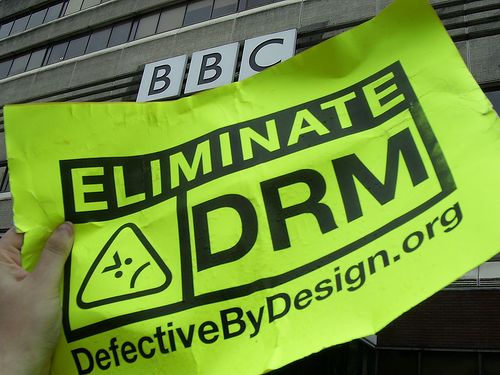 APPS
APPS
 APPS
APPS
 APPS
APPS
Much to the dismay of some, the World Wide Web Consortium has approved a digital rights management standard for Hypertext Markup Language 5, the standard markup language for creating web pages and web applications.
The new standard, described as “Encrypted Media Extensions,” is an application programming interface that allows plugin-free playback of protected or encrypted content in Web browsers across various operating systems and devices. The related Media Source Extensions offers an API for streaming video while EME provides an API for dealing with the encryption of the DRM content.
W3C sold the standard as delivering a better user experience, bringing greater interoperability, privacy, security and accessibility to viewing encrypted video on the Web.
“The EME specification has been developed with a focus on the security and privacy of the user,” W3c Project Leader Philippe Le Hégaret said in a statement. “Compared to previous methods of viewing encrypted video on the Web, EME has the benefit that all interactions happen within the browser. EME moves the responsibility for interaction with encrypted video from plugins to the browser, which acts as a true user agent.”
But the implementation of a DRM standard in HTML was not welcomed by all. The Electronic Frontier Foundation led the criticism by resigning from W3C in protest. The EFF has been known to be obstinate on issues in the past, but the organization, recognizing that the implementation of DRM support in HTML5 was inevitable, instead proposed a compromise in the form of a covenant that would bind all those using EME to agree to not use provisions in the Digital Millennium Copyright Act to take actions against security researchers who crack the DRM in the EME standard.
“Such a covenant would have helped protect the key stakeholders, present and future, who both depend on the openness of the Web, and who actively work to protect its safety and universality,” the EFF said in an open letter. “It would offer some legal clarity for those who bypass DRM to engage in security research to find defects that would endanger billions of web users; or who automate the creation of enhanced, accessible video for people with disabilities; or who archive the Web for posterity.”
Web users will see no difference now that EME has been approved. Support for the HTML5 standard is already provided by many companies and organizations, including Google LLC, Microsoft Corp., Netflix Inc., The Mozilla Foundation, Apple Inc., Cable Television Laboratories Inc. and Adobe Systems Inc.
However, the EFF said in its letter that it had “spoken to many, many members’ representatives who privately confided their belief that the EME was a terrible idea (generally they used stronger language) and their sincere desire that their employer wasn’t on the wrong side of this issue. You have to search long and hard to find an independent technologist who believes that DRM is possible, let alone a good idea. Yet, somewhere along the way, the business values of those outside the web got important enough, and the values of technologists who built it got disposable enough, that even the wise elders who make our standards voted for something they know to be a fool’s errand.”
The EFF also provided some examples of what it believes will be problems with the EME:
“Today, the W3C bequeaths an legally unauditable attack-surface to browsers used by billions of people. They give media companies the power to sue or intimidate away those who might re-purpose video for people with disabilities. They side against the archivists who are scrambling to preserve the public record of our era. The W3C process has been abused by companies that made their fortunes by upsetting the established order, and now, thanks to EME, they’ll be able to ensure no one ever subjects them to the same innovative pressures.”
Support our mission to keep content open and free by engaging with theCUBE community. Join theCUBE’s Alumni Trust Network, where technology leaders connect, share intelligence and create opportunities.
Founded by tech visionaries John Furrier and Dave Vellante, SiliconANGLE Media has built a dynamic ecosystem of industry-leading digital media brands that reach 15+ million elite tech professionals. Our new proprietary theCUBE AI Video Cloud is breaking ground in audience interaction, leveraging theCUBEai.com neural network to help technology companies make data-driven decisions and stay at the forefront of industry conversations.